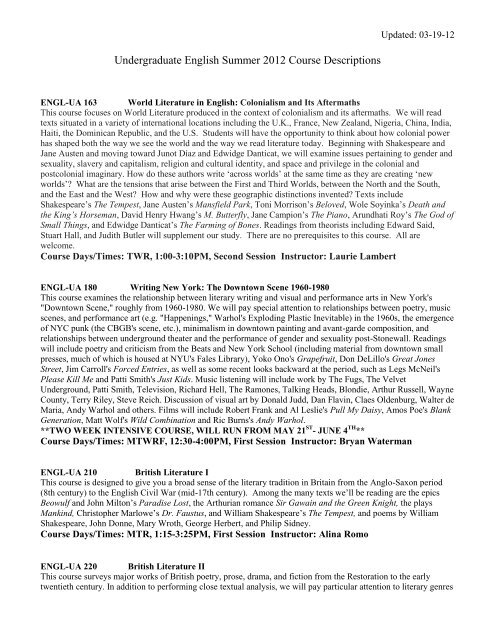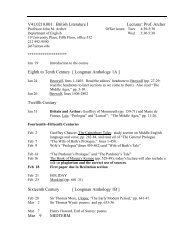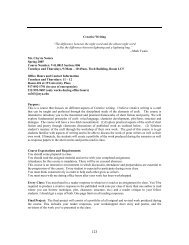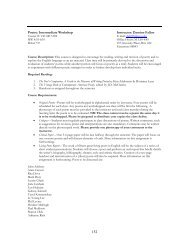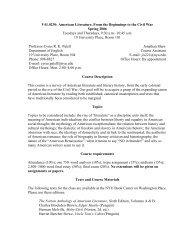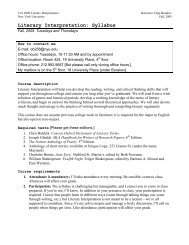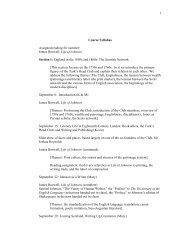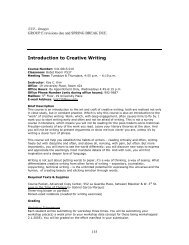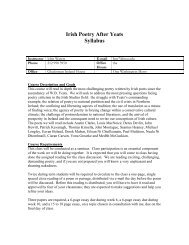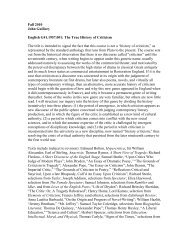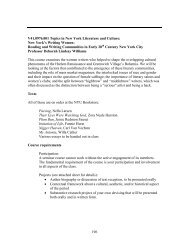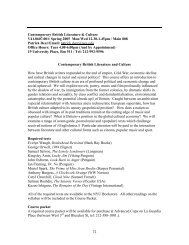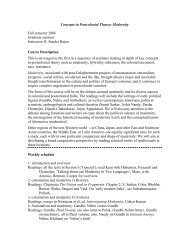Undergraduate English Spring 2003 Course Descriptions
Undergraduate English Spring 2003 Course Descriptions
Undergraduate English Spring 2003 Course Descriptions
Create successful ePaper yourself
Turn your PDF publications into a flip-book with our unique Google optimized e-Paper software.
<strong>Undergraduate</strong> <strong>English</strong> Summer 2012 <strong>Course</strong> <strong>Descriptions</strong><br />
Updated: 03-19-12<br />
ENGL-UA 163 World Literature in <strong>English</strong>: Colonialism and Its Aftermaths<br />
This course focuses on World Literature produced in the context of colonialism and its aftermaths. We will read<br />
texts situated in a variety of international locations including the U.K., France, New Zealand, Nigeria, China, India,<br />
Haiti, the Dominican Republic, and the U.S. Students will have the opportunity to think about how colonial power<br />
has shaped both the way we see the world and the way we read literature today. Beginning with Shakespeare and<br />
Jane Austen and moving toward Junot Díaz and Edwidge Danticat, we will examine issues pertaining to gender and<br />
sexuality, slavery and capitalism, religion and cultural identity, and space and privilege in the colonial and<br />
postcolonial imaginary. How do these authors write ‘across worlds’ at the same time as they are creating ‘new<br />
worlds’? What are the tensions that arise between the First and Third Worlds, between the North and the South,<br />
and the East and the West? How and why were these geographic distinctions invented? Texts include<br />
Shakespeare’s The Tempest, Jane Austen’s Mansfield Park, Toni Morrison’s Beloved, Wole Soyinka’s Death and<br />
the King’s Horseman, David Henry Hwang’s M. Butterfly, Jane Campion’s The Piano, Arundhati Roy’s The God of<br />
Small Things, and Edwidge Danticat’s The Farming of Bones. Readings from theorists including Edward Said,<br />
Stuart Hall, and Judith Butler will supplement our study. There are no prerequisites to this course. All are<br />
welcome.<br />
<strong>Course</strong> Days/Times: TWR, 1:00-3:10PM, Second Session Instructor: Laurie Lambert<br />
ENGL-UA 180 Writing New York: The Downtown Scene 1960-1980<br />
This course examines the relationship between literary writing and visual and performance arts in New York's<br />
"Downtown Scene," roughly from 1960-1980. We will pay special attention to relationships between poetry, music<br />
scenes, and performance art (e.g. "Happenings," Warhol's Exploding Plastic Inevitable) in the 1960s, the emergence<br />
of NYC punk (the CBGB's scene, etc.), minimalism in downtown painting and avant-garde composition, and<br />
relationships between underground theater and the performance of gender and sexuality post-Stonewall. Readings<br />
will include poetry and criticism from the Beats and New York School (including material from downtown small<br />
presses, much of which is housed at NYU's Fales Library), Yoko Ono's Grapefruit, Don DeLillo's Great Jones<br />
Street, Jim Carroll's Forced Entries, as well as some recent looks backward at the period, such as Legs McNeil's<br />
Please Kill Me and Patti Smith's Just Kids. Music listening will include work by The Fugs, The Velvet<br />
Underground, Patti Smith, Television, Richard Hell, The Ramones, Talking Heads, Blondie, Arthur Russell, Wayne<br />
County, Terry Riley, Steve Reich. Discussion of visual art by Donald Judd, Dan Flavin, Claes Oldenburg, Walter de<br />
Maria, Andy Warhol and others. Films will include Robert Frank and Al Leslie's Pull My Daisy, Amos Poe's Blank<br />
Generation, Matt Wolf's Wild Combination and Ric Burns's Andy Warhol.<br />
**TWO WEEK INTENSIVE COURSE, WILL RUN FROM MAY 21 ST - JUNE 4 TH **<br />
<strong>Course</strong> Days/Times: MTWRF, 12:30-4:00PM, First Session Instructor: Bryan Waterman<br />
ENGL-UA 210 British Literature I<br />
This course is designed to give you a broad sense of the literary tradition in Britain from the Anglo-Saxon period<br />
(8th century) to the <strong>English</strong> Civil War (mid-17th century). Among the many texts we’ll be reading are the epics<br />
Beowulf and John Milton’s Paradise Lost, the Arthurian romance Sir Gawain and the Green Knight, the plays<br />
Mankind, Christopher Marlowe’s Dr. Faustus, and William Shakespeare’s The Tempest, and poems by William<br />
Shakespeare, John Donne, Mary Wroth, George Herbert, and Philip Sidney.<br />
<strong>Course</strong> Days/Times: MTR, 1:15-3:25PM, First Session Instructor: Alina Romo<br />
ENGL-UA 220 British Literature II<br />
This course surveys major works of British poetry, prose, drama, and fiction from the Restoration to the early<br />
twentieth century. In addition to performing close textual analysis, we will pay particular attention to literary genres
Updated: 03-19-12<br />
and consider how kinds of writing mediated writers' responses to shifting political, cultural, and technological<br />
conditions. In lectures, class discussions, and written assignments, students will develop their close-reading and<br />
critical writing skills.<br />
<strong>Course</strong> Days/Times: MTW 9:15-11:25AM, Second Session Instructor: Rebecca Starkins<br />
ENGL-UA 230 American Literature I<br />
Beginning with the European exploration of the Americas through the eve of the Civil War, this course offers a<br />
broad survey of the texts, concepts, and authors understood as integral to the evolution of an American literary<br />
culture. In the course, students will explore the contested contact zones created by colonial settlement, the political<br />
unity as well as the fissures produced by the War for Independence, the rise of a nascent national culture in relation<br />
to an increasingly globalized world, and finally the politically contentious and aesthetically effulgent explosion of<br />
texts called the “American Renaissance.” Looking at these political and cultural moments will lead us to examine<br />
how texts represent acts of religious devotion, encounters between European and Native American cultures,<br />
negotiations of gender and sexuality, the rise of sentimentality and domestic ideology, responses to slavery and<br />
abolition as well as the development of Transcendentalist philosophies of art and citizenship. Students will read a<br />
number of texts generally recognized as classics of American literature—Franklin’s Autobiography, Douglass’s<br />
Narrative of the Life, Hawthorne’s The Scarlet Letter—as well as an array of marginally canonical texts, ranging<br />
from Native American oral narratives, to sentimental novels, to William Apess's political tracts. Evaluation of<br />
students’ progress will include several short written exercises, a longer essay, and a cumulative final exam.<br />
<strong>Course</strong> Days/Times: TWR, 9:15-11:25AM, First Session Instructor: Bridget McFarland<br />
ENGL-UA 252 Topics: Global Modernism<br />
This class considers case studies in a global history of modernism in relation to two competing models of place: the<br />
ethnographic turn toward place that began in the late eighteenth century and continues in a wide array of projects<br />
today and, on the other hand, the idea of frictionless internationalism manifest in early twentieth-century<br />
modernism, and perhaps most of all in the slightly later concrete poetry movement. There will be particular<br />
emphasis on poetry, much of which we will read closely in class. Examples will likely come from Turkey,<br />
Lebanon, Morocco, Algeria, Brazil, Scotland, Ireland, England, The United States, Russia, Germany, France, The<br />
Francophone Caribbean (Martinique), Switzerland, Greece, Italy, and Iraq.<br />
The class will help students learn both to read poetry closely, and to consider its possible roles (and the roles of<br />
literature more generally) within intellectual and social history. We will also consider literature’s relation to other<br />
fields in the humanities including anthropology, history, political science, philosophy and art history. Our main text<br />
will be the three volumes of Jerome Rothenberg’s and Pierre Joris’s anthology Poems for the Millennium.<br />
** THREE WEEK INTENSIVE COURSE, WILL RUN FROM MAY 21 ST - JUNE 11 TH .**<br />
<strong>Course</strong> Days/Times: MTW, 9:30-1:25PM, First Session Instructor: Lytle Shaw<br />
ENGL-UA 412 Shakespeare and Elizabethan Theatre<br />
This course will examine eight of the most famous plays of the Elizabethan and Jacobean theater, including both<br />
Shakespeare's plays and other works of drama of the late 16th and early 17th century. Genres we will read include<br />
revenge tragedies, city comedies, romance, and history. In reading Shakespeare's plays alongside the work of other<br />
dramatists of the period, we will come to a greater understanding of the rich variety of Elizabethan drama and of the<br />
dynamics of influence in place in the early modern theaters. Among the non-Shakespearean dramatists we will read<br />
are Christopher Marlowe, Thomas Middleton, and Francis Beaumont.<br />
<strong>Course</strong> Days/Times: TWR, 3:30-5:40PM, Second Session Instructor: Liza Blake<br />
ENGL-UA 712 Major Texts in Critical Theory<br />
As the late critic Edward Said insisted, “literary criticism has always contained some sense of its place in the<br />
process of human history.” But in our moment of increasing ecological disaster, is a sense of criticism's place in<br />
human history enough? This course will provide an introduction to major texts from a long history of critical theory
Updated: 03-19-12<br />
(from the Presocratics to Derrida) through basic questions about the responsibilities and function of criticism. In<br />
particular, we will explore how criticism affects and is affected by phenomena beyond those of human making. The<br />
course will introduce foundational texts of Classical and Medieval critical thought alongside enlightenment<br />
philosophy, phenomenology, deconstruction, feminism, queer theory, 'thing theory' and the recent 'speculative<br />
realism' movement.<br />
<strong>Course</strong> Days/Times: MTR, 12:30-2:40PM, Second Session Instructor: Daniel Remein<br />
ENGL-UA 728 Science Fiction<br />
Considers contemporary science fiction as literature, social commentary, prophecy, and a reflection of recent and<br />
possible future trends in technology and society. Writers considered include such authors as Isaac Asimov, J. G.<br />
Ballard, Octavia Butler, Arthur C. Clark, Samuel Delany, Philip K. Dick, William Gibson, Robert Heinlein, Frank<br />
Herbert, Ursula K. Le Guin, Neal Stephenson, and Bruce Sterling.<br />
<strong>Course</strong> Days/Times: MTR, 1:15-3:25PM, First Session Instructor: Eliot Borenstein<br />
ENGL-UA 755<br />
Representations of Women<br />
Eve: the fallen woman. Lucrece: the chaste wife. Cleopatra: the African temptress.<br />
Blurring the boundary between history and myth, these three women have inspired paintings, sculptures, histories,<br />
drama, poems, musical compositions, and films. We will examine representations of Eve, Lucrece, and Cleopatra<br />
from all of these categories and more to explore how these three women have come to represent very different types<br />
of femininity. In addition to looking at renditions of their stories across place and time, we will ask questions of the<br />
genres and media we encounter: how do the vehicles in which representations are made change the way we react to<br />
and analyze those representations? Do we respond differently to poems and paintings, films and operas, blogs and<br />
epics? And what are the politics and cultural assumptions implicit in an artist‟s choice of genre and medium to<br />
represent an icon of womanhood? Objects of study will include literary and historical texts by Plutarch,<br />
Shakespeare, Christina Rossetti, and Ursula K. Le Guin; as well as visual, musical, cinematic and other works by<br />
Rembrandt, Benjamin Britten, Paul Anka, Samara Weiss, Tamara de Lempicka, and the National Geographic<br />
Society. In addition to investigating the histories of Eve, Lucrece, and Cleopatra, the goals of the course include<br />
understanding genres as shifting models, rather than fixed categories; questioning assumptions about the political<br />
and cultural value of different genres and media; and challenging the generic norms of academic work by working<br />
collaboratively and merging criticism and analysis with creative practices. Assignments for this course will require<br />
student collaboration and a balance between critical and creative modes. Students will be encouraged to work<br />
outside the traditional genres of academic work—i.e. the standard, singly-written literary analysis paper—and to<br />
develop their projects using collaborative thinking and generic flexibility.<br />
<strong>Course</strong> Times/Days: MTW, 3:30-5:40PM, First Session, Instructors: Q. Sarah Ostendorf, Johanna<br />
Devereaux


